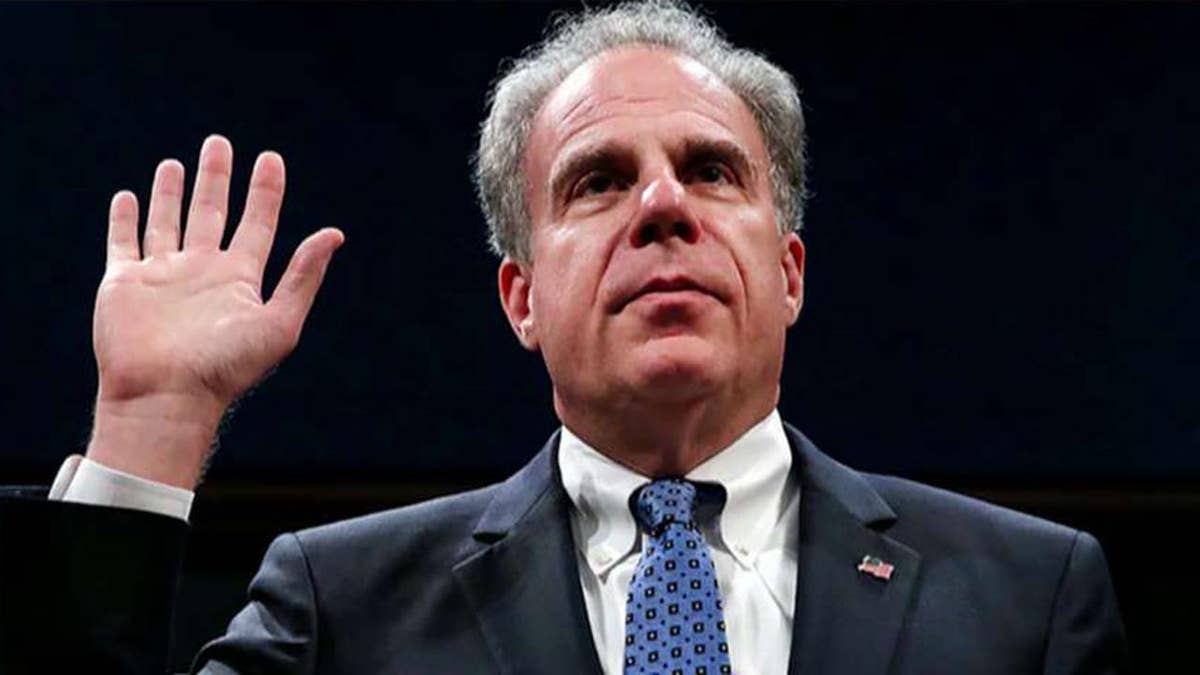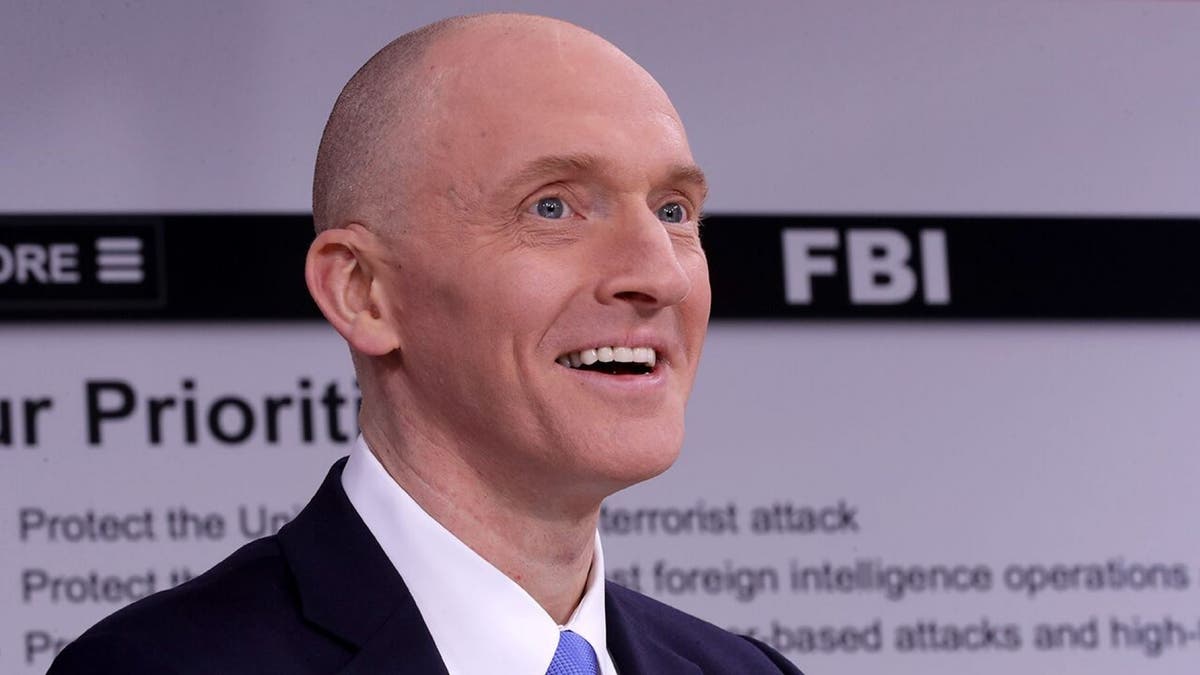Matthew Whitaker on whether reforms in House FISA bill go far enough
Former acting Attorney General Matt Whitaker joins David Asman on 'CAVUTO Live.'
New findings by the Justice Department inspector general that the FBI has repeatedly violated surveillance rules stood in stark contrast to the years of assurances from top Democrats and media commentators that bureau scrupulously handled Foreign Intelligence Surveillance Act (FISA) warrants -- and prompted Republican lawmakers to caution that the FBI seemingly believes it has "carte blanche to routinely erode the liberties of Americans without proper justification."
The DOJ watchdog identified critical errors in every FBI wiretap application that it audited as part of the fallout from the bureau's heavily flawed investigation into former Trump advisor Carter Page, who was surveilled in part because of a largely discredited dossier funded by the Hillary Clinton campaign and the Democratic National Committee (DNC). An FBI lawyer in that case even falsified a CIA email submitted to the FISA court in order to make Page's communications with Russians appear nefarious, the DOJ inspector general found; and the DOJ has concluded that the Page warrant was legally improper.
But, the DOJ's new assessment indicated that FISA problems were systemic at the bureau and extended beyond the Page probe. In four of the 29 cases the DOJ inspector general reviewed, the FBI did not have any so-called "Woods files" at all, referring to mandatory documentation demonstrating that it had independently corroborated key factual assertions in its surveillance warrant applications. In three of those applications, the FBI couldn't confirm that Woods documentation ever existed.
The other 25 applications contained an average of 20 assertions not properly supported with Woods materials; one application contained 65 unsupported claims. The review encompassed the work of eight field offices over the past five years in several cases.
“As a result of our audit work to date and as described below, we do not have confidence that the FBI has executed its Woods procedures in compliance with FBI policy,” the DOJ IG wrote in a memo today to FBI Director Christopher Wray.
Reaction on Capitol Hill, where Wray has already promised bureau-wide reforms, was scathing.

DOJ inspector general Michael Horowitz
“If the FBI is going to seek secret authority to infringe the civil liberties of an American citizen, they at least need to show their work," Senate Finance Committee Chairman Chuck Grassley, R-Iowa, said in a statement Tuesday. "FBI rules demand FISA applications be ‘scrupulously accurate’ and backed up by supporting documents to prove their accuracy. But we know that wasn’t the case when the FBI sought and received the authority to spy on Carter Page."
Grassley added: "Based on the inspector general’s audit, the flawed Page case appears to be the tip of the iceberg. Not a single application from the past five years reviewed by the inspector general was up to snuff. That’s alarming and unacceptable. The inspector general’s decision to bring these failures to the director’s attention before its audit is even completed underscores the seriousness of these findings."
"It Ain’t Easy Getting a FISA Warrant: I Was an FBI Agent and Should Know," read a 2017 article from former FBI special agent and CNN analyst Asha Rangappa, who spent most of her career as a university admissions administrator. It is unclear whether Rangappa has ever handled a FISA application.
In the piece, Rangappa credulously asserted that FISA applications, after a preliminary exhaustive review, travel "to the Justice Department where attorneys from the National Security Division comb through the application to verify all the assertions made in it. Known as 'Woods procedures' after Michael J. Woods, the FBI Special Agent attorney who developed this layer of approval, DOJ verifies the accuracy of every fact stated in the application."
FISA COURT BLOCKS FBI AGENTS LINKED TO PAGE PROBE FROM SEEKING WIRETAPS;
Rangappa, who repeated the same message on-air multiple times, was not alone in the media in propping up the FISA process. A comprehensive review by The Washington Post's Erik Wemple underscored how Politico national security reporter Natasha Bertrand launched her career in part through ultimately debunked reporting on the Steele dossier.
Bertrand, who told MSNBC that securing a FISA warrant was "extremely difficult," even claimed at one point that DOJ investigators found the dossier's author, Christopher Steele, credible.
“The interview was contentious at first, the sources added, but investigators ultimately found Steele’s testimony credible and even surprising," Bertrand wrote. "The takeaway has irked some U.S. officials interviewed as part of the probe — they argue that it shouldn’t have taken a foreign national to convince the inspector general that the FBI acted properly in 2016.”
As Wemple noted, however, DOJ inspector general Michael Horowitz found numerous problems with the FBI's reliance on Steele, including its failure to alert the FISA court to a series of apparent problems with his credibility.
Wemple's Washington Post itself ended up in the Page FISA application as a key source alongside the dossier. A 2016 opinion piece by the Post's Josh Rogin entitled, "Trump campaign guts GOP’s anti-Russia stance on Ukraine," had overstated developments at the Republican National Convention in 2016. A single delegate had proposed a sweeping amendment to change the GOP platform to provide lethal weapons to Ukraine, in a major shift from the Obama administration's policy; parts of that amendment were rejected.
But, the Post's opinion piece framed the development as nefarious, and a possible smoking gun. In a Page FISA application, the FBI went on to cite Rogin's article word-for-word -- without quotation marks, but with a footnoted citation -- as evidence that the Trump campaign could be working with the Russians in an illicit manner. The FBI apparently did not obtain independent verification of the article’s claims.
Nevertheless, for several years, Democrats and other analysts at The New York Times, The Washington Post and CNN have repeatedly claimed that key claims in the Clinton-funded anti-Trump dossier had been corroborated and that the document was not critical to the FBI's warrant to surveil Page. Horowitz repudiated that claim, with the FBI's legal counsel even describing the warrant to surveil Page as "essentially a single source FISA" wholly dependent on the dossier.
Among the unsubstantiated claims in the dossier: that ex-Trump lawyer Michael Cohen traveled to Prague to conspire with Russian hackers; that the Trump campaign was paying hackers working out of a nonexistent Russian consulate in Miami; that a lurid blackmail tape of Trump existed and might be in Russian possession; and that Page was bribed with a 19 percent share in a Russian company.
In 2018, Vox published a piece by Zack Beauchamp titled, "The Democratic rebuttal to the Nunes memo tears it apart." That was a reference to the memo authored by Rep. Adam Schiff, D-Calif., and his intelligence panel, in rebuttal to Rep. Devin Nunes, R-Calif., and his memo's concerns that the FISA process was heavily flawed.
"Democratic Rep. Adam Schiff brought receipts," the article declared confidently.
"This is a pretty thorough demolition of Nunes’ insinuations of impropriety by FBI/DOJ, which were pretty weak as it stands," Julian Sanchez, a supposed expert on surveillance at the libertarian Cato Institute, claimed in the article. "Also clarifies that Steele’s reporting re: Page was eventually corroborated."
"The key question in an application like this isn’t whether the source liked the target; it’s whether the specific claims they’re making are credible," Beauchamp writes. "And the Schiff memo points out that the FBI had independent reasons to believe that Steele’s arguments were credible."
Among those reasons, Beauchamp claimed, was that "Page had been on the bureau’s radar for some time — as he had been approached by Russian spies in the past as a potential intelligence asset. According to Schiff, the October FISA application laid out Page’s connections to the Kremlin 'in detail.' For instance, while Page was working for Trump, in July 2016, he traveled to Moscow to give a commencement speech at a Russian university, which certainly would have raised some red flags at the bureau."
Since the Vox article was published, the DOJ inspector general found that ex-FBI attorney Kevin Clinesmith doctored a CIA email to help secure the Page warrant. Specifically, the FBI reached out to the CIA and other intelligence agencies for information on Page; the CIA responded in an email by telling the FBI that Page had contacts with Russians from 2008 to 2013, but that Page had voluntarily reported the contacts to the CIA and was serving as a CIA operational contact and informant on Russian business and intelligence interests.

Former Trump adviser Carter Page. (Photo by Chip Somodevilla/Getty Images)
Clinesmith then doctored the CIA's email about Page to make it seem as though the agency had said only that Page was not an active source, according to Horowitz. Then, the FBI included Page's contacts with Russians in the warrant application as evidence he was a foreign "agent," without disclosing to the secret surveillance court that Page was voluntarily working with the CIA concerning those foreign contacts.
In his Vox article, Beauchamp also excuses the FBI for not fully disclosing its knowledge of Steele's apparent bias and the factual problems with his dossier because the bureau noted in a footnote to its Page FISA that “the FBI speculates” that Steele had been hired to find “information that could be used to discredit Candidate #1’s [Trump’s] campaign.”
That disclosure was insignificant and incomplete, Nunes alleged -- and contrary to Schiff and Beaucahmp's claims, Horowitz ultimately supported Nunes' findings.
Connecticut U.S. Attorney John Durham's criminal probe concerning the FBI's Russia probe remains ongoing. It has emerged since former National Security Adviser Michael Flynn's guilty plea that the FBI officials who interviewed Flynn, anti-Trump agent Peter Strzok and "SSA [Supervisory Special Agent] 1," have each separately been implicated by Horowitz in apparent misconduct and mismanagement in both the Flynn case and the Carter Page matter.
Strzok's misconduct and anti-Trump bias are well-documented. The identity of SSA 1 is protected in the Flynn legal proceedings by a court order, but Fox News has identified the agent as Joe Pietnka, who moved last year from the Washington, D.C., area to San Francisco. Pientka briefly appeared on the FBI's website as an "Assistant Special Agent in Charge" of the San Francisco field office late last year, according to the Internet archive Wayback Machine.
However, Pientka no longer appears on any FBI website after being removed shortly after Fox News identified him as the unnamed SSA in the IG report; Fox News is told Pientka received a promotion to a senior role in the bureau's San Francisco field office. Pientka's extensive role in handling the Page FISA has been outlined in Horowitz's report, and top Republican senators, including Sen. Lindsey Graham, R-S.C., have requested that Pientka sit for an interview to explain himself.
"The media for FOUR FU--ING YEARS propped up expert after expert to tell us that FISA warrants are different!" independent journalist Mike Cernovich wrote on Twitter on Tuesday. "If you want to know why people don't trust experts anymore, here is your latest reason."















































